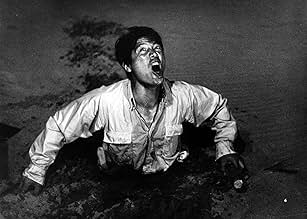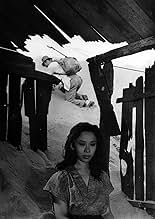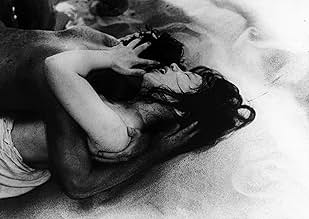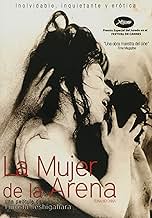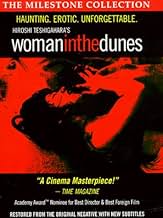Un entomólogo que está de viaje es atrapado por aldeanos locales para que conviva con una mujer que dedica su vida a extraer arena para ellos.Un entomólogo que está de viaje es atrapado por aldeanos locales para que conviva con una mujer que dedica su vida a extraer arena para ellos.Un entomólogo que está de viaje es atrapado por aldeanos locales para que conviva con una mujer que dedica su vida a extraer arena para ellos.
- Nominado a 2 premios Óscar
- 11 premios ganados y 3 nominaciones en total
Opiniones destacadas
I watched this movie on a Japanese Film Festival in Berlin in 1993. I can't remember all the details but the movie really mesmerized me. It is a very unique work and I wonder why it doesn't have the cult status of other movies.
The story involves an amateur entomologist captured in a giant sand pit somewhere on the coast of a small Japanese island. He tries to escape but a mysterious woman and some nasty villagers keep pulling him back in.
Despite being made in the early sixties this film still packs a dose of eroticism that most contemporary filmmakers pray to achieve. The black and white cinematography is absolutely haunting (watch out for poor video copies which are way too dark, there is a new DVD out which shows what the original print intended)
This is about as close as you can get to a perfect film. There is nothing that could ever be improved upon.
The film reflects existential, not Zen, themes, and belongs with Camus and Beckett. Life is meaningless in this pit, there is no escape, and the day to day toil is not only a struggle, but absurd and nonsensical. There is clearly a parallel being drawn to the bugs being buried in the sand as well as struggling futilely in test tubes earlier in the movie. It also reflects man's cruelty in the bugs pinned on boards to the forced labor. The scene towards the end, where the villagers look impassively down through masks and glasses with the taiko drums pounding, demanding a lewd display, is chilling.
There are a couple of very raw erotic scenes between Okada and Kishida, heightened by the conditions they find themselves in, and notably occurring as one wipes the other down. In trying to free ourselves of this painful world and the grime it coats us with, if even for only moments, we turn to the embrace of another, and take comfort in carnal moments. It's beautiful and somewhat pathetic at the same time. Okada also experiences a moment of transcendence when he invents a water pump, and sees it as a higher achievement than his original goal of discovering a new species of beetle and having it named after him. There is humanity again, displaying intelligence in improving his lot, and vanity. It's a somewhat grim film, but there is solace in these things. Definitely worth watching.
I voted "nine" for this wonderful film, in part because it left me with a lot to think about, in part just for how well it was made. The music by Toru Takemitsu is absolutely perfect for the task, too.
This is just about my favorite kind of film: one that raises important questions about human life, but not at the expense of entertainment. It's as close as I'll probably ever come to having my cake and eating it, too.
Update, January 2007: I finally obtained my own DVD of this film, one with much higher quality photographic reproduction. I now marvel even more at the extraordinarily creative photography. Be sure, if you view this on DVD, not to boost your set's brightness: I can assure you the film is very, very dark on purpose. If possible, see it on a high-definition monitor. Today, I'd vote "ten."
¿Sabías que…?
- TriviaFor this film, Hiroshi Teshigahara became the first Japanese director to be nominated for an Oscar for directing.
- ErroresThe beard of teacher Jumpei is not growing, despite him even complaining about no opportunity to shorten it.
- Citas
Entomologist Niki Jumpei: The certificates we use to make certain of one another: contracts, licenses, ID cards, permits, deeds, certifications, registrations, carry permits, union cards, testimonials, bills, IOUs, temporary permits, letters of consent, income statements, certificates of custody, even proof of pedigree. Is that all of them? Have I forgotten any? Men and women are slaves to their fear of being cheated. In turn they dream up new certificates to prove their innocence. No one can say where it will end. They seem endless.
- ConexionesFeatured in Music for the Movies: Tôru Takemitsu (1994)
Selecciones populares
- How long is Woman in the Dunes?Con tecnología de Alexa
Detalles
- Fecha de lanzamiento
- País de origen
- Idioma
- También se conoce como
- Woman in the Dunes
- Locaciones de filmación
- Productoras
- Ver más créditos de la compañía en IMDbPro
- Tiempo de ejecución
- 2h 27min(147 min)
- Color
- Relación de aspecto
- 1.37 : 1


